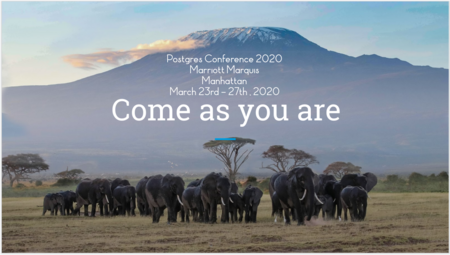PostgresConf Beijing 2019
| Join our Mailing List | Attend one of our events |
Last week was PostgresConf Beijing 2019. This event was an exercise in people understanding what it truly takes to run a conference. It was a standalone event unlike PostgresOpen China in 2018 which always takes a lot more work. We had generous sponsor support with the likes of Microsoft, Amazon Web Services, IBM, Pivotal, Inspur, HighGo, Credativ, and Command Prompt.

The overarching theme of the conference was of course People, Postgres, Data and we had many (translated) conversations about how Postgres can be the center of your Data Universe and how the ecosystem thrives with not only PostgreSQL but also technology such as TimescaleDB and Yugabyte. All of which are Open Source and enable People to use Postgres to manage their Data. In 2020, the plan is to have PostgresConf China in October or November. The timing will allow for a more moderate climate as well as have more time to generate international content.
English As A Second Language
As we continue to work with English-as-a-second-language communities we continue to find opportunities for them to grow and contribute. Of course the most common (and possibly difficult) opportunity is that in order to contribute code to PostgreSQL.Org, you must speak English. This is not an unreasonable requirement as English is the language of Computer Science.
A common piece of feedback we received was not that English was the consideration but the “level” of English proficiency was high. Unfortunately, verbosity is not always productive and it is certainly counterproductive when the vocabulary doesn’t take into account the non-native speaker. It would be a boost to productivity if we as a community tried to be succinct and as uncomplicated as reasonable in our communication. To put this another way and from a far more qualified source than us:
“Don't use a five-dollar word when a fifty-cent word will do.”
-- Mark Twain
Contribution Opportunities
While encouraging the Chinese community to contribute we continued to look for the low barrier of entry tasks. The obvious opportunity is translation of various project documentation. That is not the only prospect as PostgreSQL has fantastic extensibility and suggestions of developing new extensions. Contributing directly to PostgreSQL code has a high barrier of entry between English as a second language and overall overhead in building comprehensive knowledge of the core code. Extensions in contrast generally require needing to understand narrow areas of code to build a feature that is user-need specific. We are still exploring these opportunities but one option would be to invite extension authors to work with regional communities for translation or feature work.
Software You Weren’t Aware Of
Oleg from PostgresPro and PGConf.Russia was present and we were able to have some great conversations about the work they are doing, most of which can be found on Github. Although there is a lot of great software in that repository, the one that grabbed my eye as immediately useful was Zson. Zson is an extension that allows native compression of JSON/JSONB documents, greatly reducing disk space usage and increasing query speed of documents.
Please Replace IRC and Slack
Further conversations were had on how we can build a modern collaboration community that is internationally inviting, supports all languages, and is built on Open Source technologies. Initially it seems that Mattermost is a good contender but after further research it seems that we should also consider Matrix.org. The idea has barriers as the Chinese are partial to WeChat and the Professional U.S. community has left IRC for Slack, whereas other communities such as Brazil and Russia have settled on Telegram. We have a community member based working group determining next steps.
You may say that I'm a dreamer
But I'm not the only one
I hope someday you'll join us
And the world will be as one
-- John Lennon
Looking Forward
As People, Postgres, Data and PostgresConf continues to move forward we are looking forward to building on existing initiatives and events. We have PostgresConf Philly next week, PostgresConf Silicon Valley in September, and our next International event in October with PostgresConf South Africa. We are also continuing to work on our Inclusivity, Equit,y and Diversity initiative and launching Digital Events! This doesn’t include the growing number of meetups joining the idea of People, Postgres, Data including NYC Postgres, Silicon Valley Postgres, Philly Postgres, Seattle Postgres, and Montreal Postgres!
Quote of the week
“Those pig ears are really good.” -- Michael Meskes, Credativ and Postgresql.org committer.
|
||
The International Postgres conference series continues to grow! PGConf APAC 2018 is the latest PGConf.Org addition.
- Migration projects
- Performance troubleshooting and tuning
- noSQL and geo-spatial features of Postgres
- Unique use-case and customer stories
- Useful new features in PostgreSQL 10
To be Announced
2017-10-10: Proposals acceptance begins2017-12-04: Proposals acceptance ends2017-12-13: Authors of accepted proposals contacted
- Bhushan Uparkar on Index Skip Scan
- Mathias Brossard on psql command to show size of partition table
- Kaiting Chen on fixing quadratic performance of regexp match/split functions
Silicon Valley Postgres is the fastest growing Postgres user group within North America. It was initiated just 12 months ago and will reach 700 members likely before Monday. The group exists to help all facets of Postgres users and the Postgres ecosystem, including, but not limited to, PostgreSQL, Greenplum, Aurora Postgres, AgensGraph, Yugabyte, ZomboDB, TimescaleDB.

It is with great pleasure that we announce the final program for PGConf Local: Seattle. The schedule is still being hammered out but we have finalized the content that will be presented. Please join us in celebrating Postgres in Seattle!
- Postgres Performance and Maintenance by Joshua D. Drake
- Scaling PostgreSQL Using Linux Containers in the Enterprise by Robert Bernier
- Migrating from Oracle to PostgreSQL by Jim Mlodgenski
Track: Ops
- Develop intelligent apps on the Azure platform using the Azure Database for PostgreSQL by Sunil Kamath
- Tuning PostgreSQL for High Write Workloads by Grant McAlister
- POSTGRESQL V10: AN AMPLIFIED VERSION OF POSTGRES by Joshua D. Drake
- Enterprise Data Architecture with PostgreSQL by Kevin Kempter
- All the dirt on Vacuum by Jim Nasby
- Building a scalable time-series database on PostgreSQL by Matvey Arye
Track: Dev
- Semantic Search Web System on PostgreSQL by QUAN-HA LE
- Increase Application Performance with SQL Auto-Caching; No Code Changes by Roland Lee
- Introduction to JavaScript Stored Procedures by Jim Mlodgenski
- Under the hood: API integrations and more in an energy efficiency PostgreSQL + Django application by Jennifer Scheuerell
- Using GIS in PostgreSQL by Lloyd Albin
Tracks: Big Data, Data Science and AWS/Cloud
- With Great Power Comes Great Responsibility by Michael Sacks
- Data Quality Expert Is Not Harvard's Sexiest Job...But... by Ben Rogojan
- GRAKN.AI: the hyper-relational database for knowledge-oriented systems by Haikal Pribadi
- Best Practices with Managed PostgreSQL in the Cloud by Jignesh Shah

Where is your path leading you?

At Postgres Conference Silicon Valley I promised during the launch that after the conference was completed PostgresWarrior and I would be taking a freedom tour to various National Parks.
For us, our path is serving the community through education and professional and personal development. This happens in many forms including these newsletters.
Recent projects have been coordinating a successful webinar series from Yugabyte, creating online live Postgres instructor lead training, and launching a new educational series on PostGIS. This is all happening while the Call for Papers for Postgres Conference 2020 now open! The ongoing goal is to allow any person to receive the education they need to be successful with People, Postgres, Data year around.
Training
The current training options from Postgres Conference can be found here:
https://postgresconf.org/conferences/Postgres-Digital-Training-Series/schedule/events
We have two performance trainings coming up in October:
- PostgreSQL Performance & Maintenance on October 29th
- Finding and Fixing Slow Queries on October 30th
Both of these training opportunities sell out at the physical conferences. They are solid content and at a reasonable price (149.00 USD ) it is hard to say no to a few hours for education in your day!
Software
Are you frustrated with the limitations and fragility of Logical Replication in PostgreSQL Core? There is a new software on the block called pgcat and it has an impressive list of features to allow your Logical Replication experience to be exceptional.
Looking for a simple script to help find tuning opportunities for PostgreSQL? The perl script postgresqltuner may just be what you are looking for. Yes, there really is an active developer community for the Perl language still.
A HyperLogLog data type for PostgreSQL from our friends at Citus. This Postgres module introduces a new data type hll which is a HyperLogLog data structure. HyperLogLog is a fixed-size, set-like structure used for distinct value counting with tunable precision. For example, in 1280 bytes hll can estimate the count of tens of billions of distinct values with only a few percent error.
Our partner Heimdall Data has been creating a new type of connection pool that removes a significant limitation within other software such as PgBouncer and PgPool. If you are looking for Enterprise Authentication (Active Directory/LDAP) as well as intelligent pooling for many users (and connections), it may be worth a look. There is a webinar next week on how it all works!
Does your path allow people to “Come as you are?”
In consideration of all of the great news from our community we can’t help but reflect on the blessings we have in the world of Open Source. Remember that Open Source is about exceptionalism, creativity, and most importantly freedom. When communities start restricting these three tenets of Open Source, they are no longer Open Source communities, even if their software is.
The theme for Postgres Conference 2020 in NYC is “come as you are” and we are asserting this mantra throughout our entire community. Over the past few years there has been an influx of toxicity throughout all circles and it is time for civility and grace to return. It is time to remember that we are all human. We all have angels and demons to our personalities. We are all flawed and we are all exceptional in our own way.
"But just because I don't agree with someone on everything doesn't mean that I'm not going to be friends with them. When I say, 'be kind to one another,' I don't only mean the people that think the same way that you do. I mean be kind to everyone."
-- Ellen DeGeneres
(Yes, this happened. No, it wasn’t planned.)
Just outside of Moab Utah.
Find YOUR path.

At Postgres Conference we are always optimizing our People, Postgres, Data experience, and as more events move to Digital, we have worked hard to perfect that collaborative experience for our community. The hard work of our volunteers has paid off, our content is top notch, and our participant account is consistently high.
With a now-proven track record, we are pleased to announce that we are accepting Community and Commercial presentations via the Postgres Webinar Series Call for Presentations through the end of 2020. If your presentation is accepted we will contact you directly to arrange an appropriate time to deliver your content.
Recent awesome news
KDE, arguably the most complete desktop experience for Linux, is now hosted on a private instance of Gitlab. As is proper, Gitlab only supports Postgres as the backend database.
For those who who love #FarmFresh or #farmtotable, there is a new website that showcases Farms that are delivering. It was developed using React, Rails, and Postgres.
Upcoming Digital Events
-
July 7, 10am PT: Deep Dive into PostgreSQL Indexing
A Deep Dive into PostgreSQL Indexing
-
July 15, 10AM PT: Working with JSON Data in PostgreSQL vs. MongoDB
Working with JSON Data in PostgreSQL vs. MongoDB
Previous Digital Events:
- PostGIS Training series:
- Getting Started with PostGIS and OpenStreetMap by Ryan Lambert
- Advanced Operations and Features by Ryan Lambert
- Exploring OpenStreetMap from PostGIS: Tools and Queries by Ryan Lambert
- Loading PostGIS with osm2pgsql by Ryan Lambert
- PostGIS Spatial Queries and Performance Tuning by Ryan Lambert
- PostgreSQL 12 and PostGIS 3.0 by Ryan Lambert
- Ops:
- FPGA: an Easier Path to Parallelism for Postgres? by Andrew Ellicott
- How to Deploy a SQL Database on Kubernetes by Chris Casano
- How to Move Data from Oracle to Postgres in Near-Real Time by Joshua Drake
- A Deep Dive into PostgreSQL Indexing by Ibrar Ahmed
- Mostly mistaken and ignored PostgreSQL parameters while optimizing a PostgreSQL database by Avinash Vallarapu
- Deeper Understanding of PostgreSQL Execution Plan: At plan time and run time by Jobin Augustine
- A Deep Dive into PostgreSQL Indexing by Ibrar Ahmed
- Enterprise Authentication and Connection Pooling by Erik Brandsberg
- Case Studies
- YugabyteDB: a distributed PostgreSQL database by Bryn Llewellyn
- Community vs. Enterprise Open Source – Which is Right for Your Business? by Justin Reock
- Postgres vs. MongoDB for real-time machine learning on wind turbine data by Luis Manuel Carril
- Turning PostgreSQL into a Cloud Native Data Service by Julian Fischer
- Scaling PostgreSQL: Never Shard Again and Gain Effortless Scale by Jim Walker
- Bring Compression to Postgres at Zero Cost of Performance by Tong Zhang
Silicon Valley Postgres and PostgresConf Silicon Valley are happy to announce that early bird tickets are now available! You can purchase them here. You will want to hurry as early bird discounted tickets are only available until September 1st, 2018.
PostgresConf Silicon Valley takes place on October 15th and 16th, 2018 at the Hilton San Jose. The schedule is not finalized. However, we have a comprehensive list of content from technical leaders in the Postgres ecosystem we are reviewing. Here is a brief list of some (but not all!) of the topics to be presented:
- Postgres 11
- Data integrity at scale
- Distributed data and GPDR
- Massively Parallel Postgres for Analytics
- Data intersection between roles
- RDS tips and tricks
- I didn’t know Postgres could do that!
- Performant time-series data management analytics
PostgresConf is organized by an all volunteer team of fantastic individuals and is backed by a 501c3 non-profit. The Silicon Valley conference provides the most cost effective avenue to learn all about Postgres and the Postgres ecosystem. We invite everyone to enjoy our expertly delivered presentations, good food, the hallway track and the opportunity to learn, network and appreciate everything that is Postgres.

Come as you are
The theme of Postgres Conference for 2020 is: Come as you are. We want everyone to feel welcome. You are welcome for your love of People, Postgres, Data and a desire to ascend beyond the box. It isn’t about your race, gender, sexuality, political affiliation, or love of blueberry flavored popcorn. It is 100% about you, the creativity and excellence that only you can bring to our community.
Postgres Conference 2020 CFP now open
We are actively seeking content for the largest Postgres Conference in the world, set to be held from March 23rd to 27th, 2020 at the Marriott Marquis, Time Square! Please submit your content here.
Postgres Conference Silicon Valley 2019
Postgres Conference Silicon Valley doubled its attendance, making it the largest Postgres Conference on the West coast ever! We are very pleased to be able to bring so many community members together for education, fun, and ecosystem support!
Training
- Postgres Conference is now offering live digital training throughout the year. Continuing on our mission of creating exceptional Postgres people, you can now not only register for pre-defined training but request specific training and we will connect you with a class! The current training options are:
- PostgreSQL Performance and Maintenance
- Finding and Fixing slow queries
- Postgres + Kubernetes: yes it really is a match made in heaven
- PostgreSQL Replication deployment and best practices
- PgPool-II Performance and best practices
Register here: https://postgresconf.org/conferences/Postgres-Digital-Training-Series
Digital Events
We have free digital events coming up including topics such as Kubernetes, DistributedSQL, Backups, Postgis and many more. Coming up:
- Yugabyte Digital Webinar Series.
- Heimdall Data is providing a Webinar on October 22nd on Enterprise Authentication and Connections pooling




